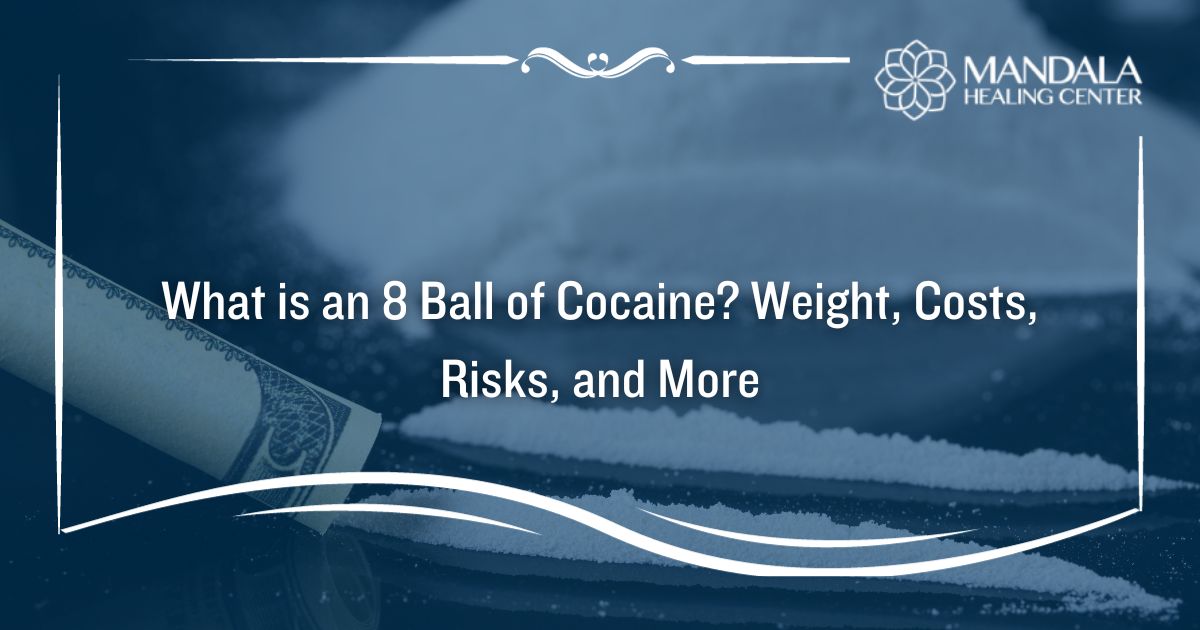Cocaine is a highly addictive stimulant drug that many people abuse. According to the National Institute of Drug Abuse (NIDA), nearly 5 million people reported using cocaine in 2021.[1] Because cocaine speeds up messages between the brain and body, it can cause a euphoric rush of energy.
There are many slang terms associated with cocaine, but one of the most common is “8 ball.” The term “8 ball” doesn’t refer to a specific type of cocaine, instead, it is used to describe a particular amount. Many people who abuse the substance boast about having an 8 ball because it refers to having a large amount.
How Much Does an 8 Ball of Cocaine Weigh and Cost?
The slang term “8 ball” is used to describe having an eighth of an ounce, or 3.5 grams of cocaine. To put this in perspective, the minimal lethal dose of cocaine is considered to be 1.2 grams. In other words, only using 1/3rd of an 8 ball can lead to a life-threatening overdose.
The cost of an 8-ball differs greatly depending on several factors, including your location and the supply and demand of the substance. According to the United Nations, a gram of cocaine cost about $200 in 2019.[2] With that being said, an 8-ball could cost upwards of $600.
In addition, the purity of the cocaine can affect the cost. Typically, when cocaine is cheaper than average that means it has a lot of fillers, additives, or adulterants. Cheaper cocaine can be extremely dangerous to use because it could contain lethal substances like fentanyl.
Other Slang Terms Associated With Cocaine
If you are worried that a loved one is abusing cocaine, knowing the slang terms can help you determine whether they require drug rehab. Oftentimes, people use slang terms or street names to ensure that the people around them are not aware they are discussing drugs.
The common slang terms associated with cocaine include:[3]
- White girl
- Angel powder
- Heaven
- Bump
- Columbian nose powder
- Snow
- Base
- Blanca
- Nose candy
- Reindeer dust
- Coke
- Happy dust
- Big rush
- Blow
- Booger sugar
- White powder
- Line
- Lady snow
- Speedball (heroin mixed with cocaine)
- Fish scale
What are the Effects of Cocaine?
Most people who abuse cocaine snort the drug, which causes the effects to begin almost immediately. This leads to a rush of euphoria and energy that only lasts up to an hour. As a result, it is common to binge on the drug, which may lead to life-threatening overdoses.
The short-term effects of using cocaine include:[4]
- A rush of euphoria
- Increased energy
- Talkativeness
- Mental alertness
- Hypersensitivity to sight, sound, and touch
- Decreased need for food or sleep
- Constricted blood vessels
- Dilated pupils
- Increased heart rate and blood pressure
- Heightened body temperature
- Restlessness, anxiety, or panic
- Tremors, vertigo, or muscle twitches
- Violent or aggressive behavior
Because cocaine is a stimulant, abusing it in large amounts can lead to serious cardiovascular effects. For example, cocaine abuse can lead to disturbances in heart rhythm and even heart attacks. For this reason, you should always seek help from a drug rehab center if you are addicted to cocaine.
The Long-Term Dangers of Abusing Coke
When you abuse cocaine repeatedly, you may develop a tolerance, meaning you will need a higher dose to experience the mind-altering effects. However, some people can become sensitive to the substance, needing less of it to experience adverse effects like anxiety, paranoia, or even life-threatening overdoses.[5]
Additionally, because cocaine users tend to binge on the drug, they might develop the symptoms of psychosis. This happens because of the way the substance affects your serotonin and dopamine levels.
Lastly, regular cocaine use can significantly impact your physical health, leading to:[5]
- Loss of the sense of smell
- Frequent nosebleeds
- Having a hard time swallowing
- Damage to the lungs or increased symptoms of asthma
- Tears and ulcerations in the stomach
- Significant weight loss and malnourishment
- Increased risk of heart attack and stroke
- Inflammation of the heart muscle and aortic ruptures
- Bleeding within the brain
- Impaired cognitive functioning
- Life-threatening overdoses
While cocaine can lead to a wide range of devastating health effects, getting sober can help you recover both physically and mentally. Thankfully, cocaine rehab programs like Mandala Healing Center can provide you with the tools and support you need to maintain long-term sobriety.
Find Help for Cocaine Abuse and Addiction
If you or a loved one suffers from a cocaine addiction, help is available. At Mandala Healing Center, we inspire healing in our patients through compassionate care. Going beyond the conventional approach of cocaine detoxification, patients at our facility are inspired to fully heal in an environment designed to nourish their entire being.
To learn more about how we can help you recover from cocaine addiction, contact us today.
References:
- The National Institute of Drug Abuse (NIDA): What is the scope of cocaine use in the United States, Retrieved September 2023 From https://nida.nih.gov/publications/research-reports/cocaine/what-scope-cocaine-use-in-united-states
- The United Nations Office on Drugs and Crime (UNODC): Drug Prices, Retrieved September 2023 From https://dataunodc.un.org/dp-drug-prices
- The Drug Enforcement Administration (DEA): Slang Terms and Code Words: A Reference for Law Enforcement Personnel, Retrieved September 2023 From https://www.dea.gov/sites/default/files/2018-07/DIR-022-18.pdf
- The National Institute of Drug Abuse (NIDA): What are the short-term effects of cocaine use, Retrieved September 2023 From https://nida.nih.gov/publications/research-reports/cocaine/what-are-short-term-effects-cocaine-use
- The National Institute of Drug Abuse (NIDA): What are the long-term effects of cocaine use, Retrieved September 2023 From https://nida.nih.gov/publications/research-reports/cocaine/what-are-long-term-effects-cocaine-use












